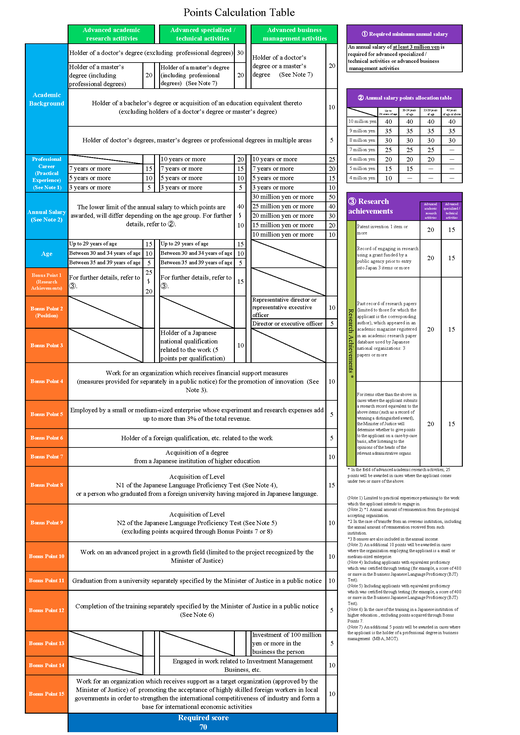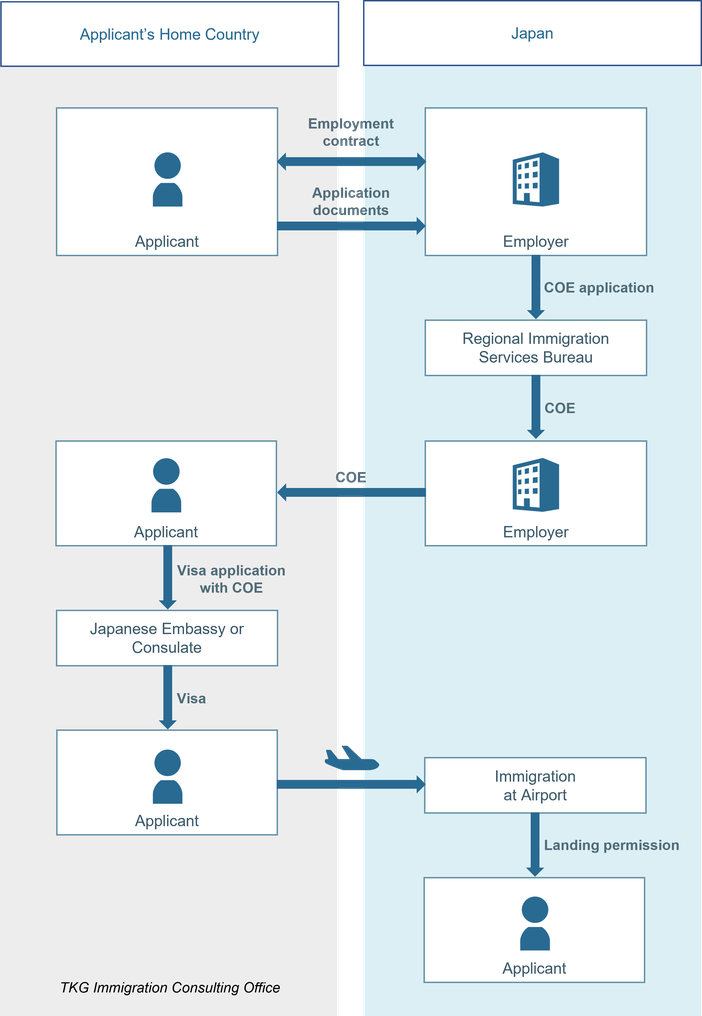"HSP - Highly Skilled Professional (高度専門職)" Visa
The Highly Skilled Professional (HSP) visa is designed to offer a range of benefits to foreign nationals possessing exceptional expertise and skills. Its purpose is to attract individuals who are expected to introduce innovation to the Japanese industry and enhance the overall efficiency of the Japanese labor market.
The HSP visa has a unique scoring system (points evaluation system) for its examination. Applicants are scored based on their academic background, work experience, salary income, and employer status. It is granted to those working in the fields of advanced academic research activities, highly specialized/technical activities, and advanced management activities.
Table of Contents:
Major benefits of HSP (Highly Skilled Professional) Visa
The following major benefits are available to you after receiving an HSP visa.
You/your spouse must meet the specific requirements for each benefit.
- You can apply for permanent residence if you maintain 80 HSP points for 1 year.
- You can apply for permanent residence if you maintain 70 HSP points for 3 consecutive years.
- You will receive an HSP visa valid for five years.
- Your spouse may work in Japan, limited to occupations that qualify for the Engineer/Specialist in the Humanities/International Services visa categories.
- You may work for one company and run another company simultaneously.
- You may bring your parents to Japan to take care of your children. ← "Permanent Resident (永住者)" visa does not offer this benefit.
Things to consider about HSP Visa
Although the HSP visa gives you a lot of benefits, you have to be aware of its limitations.
An HSP visa is designated with your employer. This means that your HSP visa (status of residence) will no longer be valid if your employment contract with your employer, the designated organization, is terminated or expires.
Therefore, if you transfer to another company and do the same job, you must apply for permission to change your status of residence to obtain an HSP visa (status of residence) that is designated with your new employer. You may begin working after your application is approved.
Requirements
Highly Skilled Professional (i)(a) (高度専門職1号イ)
- You must be engaged in activities of research, research instruction or education based on a contract signed with a public or private organization in Japan, activities of personally operating
a business related to the activities in conjunction with those activities.
Holders of the "Professor" visa and "Researcher" visa may be able to obtain this visa.
- You must score at least 70 points in the points evaluation system.
The points calculation table is available on the website of Immigration Services Agency.
PDF
Excel
Highly Skilled Professional (i)(b) (高度専門職1号ロ)
- You must be engaged in activities requiring knowledge or skills in the field of natural sciences or humanities based on a contract signed with a public or private organization in Japan or
activities to personally manage the business related to the activities in conjunction with those activities. Note that this visa does not cover "International
Services" activities such as translation and interpreting.
Holders of the "ESI (Engineer/Specialist in Humanities/International Services)" visa, except those engaged in "International Services" activities, may be able to obtain this visa.
- You must have an annual compensation of at least JPY 3,000,000.
- You must score at least 70 points in the points evaluation system.
The points calculation table is available on the website of Immigration Services Agency.
PDF
Excel
Highly Skilled Professional (i)(c) (高度専門職1号ハ)
- You must be engaged in activities to operate international trade or some other business, or to engage in the management of such business at a public or private organization in Japan, or in
conjunction with these activities, activities to personally manage the business related to such activities.
Holders of "Business Manager" visa may be able to obtain this visa.
- You must have an annual compensation of at least JPY 3,000,000.
- You must score at least 70 points in the points evaluation system.
The points calculation table is available on the website of Immigration Services Agency.
PDF
Excel

Annual Salary: It refers to the compensation expected to be paid to you by your employer, earned over a period of one year from the date you begin working after obtaining your HSP visa.
Bonus Point 4: Work for an organization which receives financial support measures (measures provided for separately in a public notice) for the promotion of innovation
→ Please ask your employer to check the public notice if they receive such assistance.
Bonus Point 11: Graduation from a university separately specified by the Minister of Justice in a public notice
→ Please check to see if the university you graduated from is included in one of the following lists.
- QS World University Rankings
- World University Rankings by Times Higher Education
- Academic Ranking of World Universities by Shanghai Ranking Consultancy
How to apply for a HSP (Highly Skilled Professional) Visa
There are two types of application to acquire a HSP (Highly Skilled Professional) visa.
-
Application for a Certificate of Eligibility (COE)
(在留資格認定証明書交付申請)
-
Application for Change of Status of Residence
(在留資格変更許可申請)
Select "Application for a Certificate of Eligibility (COE)" if you are outside Japan and will enter the country on a HSP visa status.
Select "Application for Change of Status of Residence" if you are already in Japan on another visa (Status of Residence) and wish to change it to a HSP visa without leaving the country. Please note that the Immigration Bureau will not accept an application to change from a tourist visa (temporary visitor status) to a HSP visa.
More information on "COE" and "Application for Change of Status of Residence".
HSP Visa - Application for a Certificate of Eligibility (COE)
Here's how to prepare to apply for a Certificate of Eligibility (COE) to obtain a HSP (Highly Skilled Professional) visa.
Preparation steps:
- Check your eligibility, Sign an employment contract
- Prepare certificates and official documents
- Fill out an application form
- Submit application documents (by your employer in Japan)
1. Check your eligibility and sign an employment contract (HSP - COE Application)
Make sure that you meet the eligibility requirements for a HSP (Highly Skilled Professional) visa, including scoring at least 70 points on the Points Calculation Table.
As shown in Bonus Points 4 in the table, some of the bonus points are related to your employer, so we recommend that you review the points with your employer.
If you do not feel confident, it may be a good idea to consult with us or to ask your employer if they would be willing to consult with us.
Once your eligibility has been confirmed, sign an employment contract.
2. Prepare certificates and official documents
You and your employer must obtain and collect the following certificates and official documents.
YOU (APPLICANT) will prepare the following certificates and official documents.
| Document |
Note |
|
Photocopy of Passport |
|
|
Photocopy of: Certificate of Doctoral Degree (修士学位授与証明書の写し) Certificate of Master's Degree (博士学位授与証明書の写し) Certificate of Graduation (卒業証書の写し)
Certificate of Bachelor's Degree (学士学位授与証明書の写し) |
*Prepare the certificates that correspond to your score in the points calculation table. |
| Certificate of Employment (在職証明書) |
*The certificate shall be issued by your former employer. *The certificate must clarify the period and the description of the work that is the same as the one you will be doing in Japan. |
| Photocopies of Certificates proving that you qualify for the bonus point 1, 2, 3, 6, 7, 8, 9, 11, 12, 13, and 14 in the points calculation table |
*Prepare the certificates if you qualify for the bonus point 1, 2, 3, 6, 7, 8, 9, 11, 12, 13, and 14 in the points calculation table. *Your name must be identified on the certificate. |
Your EMPLOYER in Japan will prepare the documents listed in the lower column of the "Professor" to "Journalist" or "Business Manager" to "Skilled labor" statuses in Appended Table 3 of the Regulation for Enforcement of the Immigration Control and Refugee Recognition Act, depending on the activity you intend to engage in Japan. If the documents submitted for the status of residence corresponding to the activity you intend to perform in Japan are divided into categories, please submit the documents corresponding to the appropriate category.
Your employer will also prepare certificates to prove that you qualify for the bonus point 4, 5, 10, and 15 in the calculation table if you are eligible for those points.
You may find it very difficult to prepare documents, as the documents required for an application vary greatly depending on the category. It may be a good idea for your employer to consult with a regional immigration services bureau or professionals, including immigration lawyers, to determine what documents they need to prepare.
More information will be available soon.
Note: On our website, we prefer using the term "Visa" instead of "Status of Residence," even though the latter is legally accurate in most contexts. We've made this choice because we understand that, in many conversations among foreign nationals in Japan, the term "Visa" is commonly used to refer to "Status of Residence." Our goal is to keep our website concise and friendly to those in need of information about the immigration system in Japan. Please see "Difference between Visa and Status of Residence" for more details.
Copyright 2023-2024 TKG Immigration Consulting Office All Rights Reserved.

